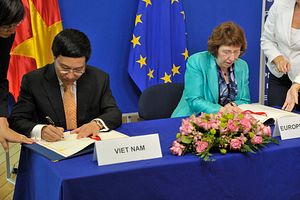On June 30, the European Union and Vietnam inked a landmark economic agreement. While the free trade deal has been applauded for its economic and geopolitical significance, it also says a lot about how Vietnam is deftly managing its challenges relative to some other Asian states facing the same regional environment.
Make no mistake: Vietnam’s human rights record is dismal and deserves criticism, and its current treatment of dissidents should continue to raise significant concerns. However, the key takeaway of the EU-Vietnam deal is that it shows how sharp Hanoi’s diplomatic skills are on the foreign stage.
For Vietnam, the EU deal was a triumph over significant challenges. The EU has long had reservations about Vietnam’s human rights and democracy record, and some of those concerns increased in the past few years and threatened to end the deal itself.
Nonetheless, at the end of the day, this is clearly a win for Vietnam. Hanoi scored an unprecedented deal for a developing country in Asia, with tariffs to be cut over a 10-year period with some exceptions. The EU itself characterized this as “the most ambitious free trade deal ever concluded with a developing country.”
Under the deal, Vietnam will this year cut tariffs on 65 percent of imports from the EU, expanding over 10 years to cover 99 percent. The EU will reciprocate on 71 percent of Vietnamese imports, covering nearly all Vietnamese products within seven years.
But if Vietnam wins with this, then who loses? That’s an important question, because Hanoi’s savvy in the wake of its situation is something that is assessed relative to some other key regional states.
Take, for instance, Thailand. Already, commentary in Thailand has noted that Bangkok, which has not moved ahead on a free trade agreement with the EU, stands to lose with the Vietnam-EU agreement. The loss could affect Thai exports in areas such as cars, computers, and electric circuits, as well as garments, jewelry, rice, and processed seafood.
Kasikorn bank reckoned a similar deal between Thailand and the EU would save its producers around $1 billion a year and Pimchanok Vonkorpon, director-general of the Trade Policy and Strategy Office, admitted that Thailand lacked skilled laborers, higher technologies, and innovation.
Another loser could be China. China is already suffering an exodus of foreign manufacturers, heading south of the border as a result of its trade war with the United States, and analysts expect the EU deal will only add to that momentum.
That includes Chinese manufacturers hoping to find an alternative base to avoid disruptions to supply chains. Shifting to Vietnam is now a realistic prospect. Inbound investment into Vietnam could soon overtake investment in Guangdong province in China, and this is propelled by other dynamics as well, including the U.S.-China trade war and the direction of Beijing’s economic policy.
Of course, the extent to which this is a Vietnam win remains to be seen. The deal has been hailed as a new generation of bilateral agreement, with provisions on things like intellectual property protection, investment liberalization, and sustainable development. This includes commitments to human rights, including on labor rights.
In that vein, advocates are already warning the deal would have “dire consequences” for worker rights and the ability to prevent climate and ecological breakdown, and the EU might see a backlash in putting trade ahead of human rights. Their concerns may be justified, and its passage could be impeded by like-minded politicians in the European Parliament.
Luke Hunt can be followed on twitter @lukeanthonyhunt

































